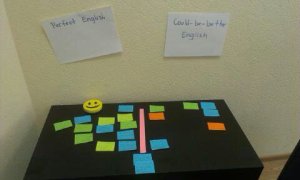Update. I was very happy to hear that this post got shortlisted for Teaching English – British Council blog award. If you decide to vote for it (in which case, THANK YOU! :)), let them know by ‘liking’ the post on their facebook page: ow.ly/MrfLk.
Levels: B1+/B2
Length: 90 minutes
Course type: Business English
Materials: Worksheet (also see the Update with a more elaborate version two lines below)
If you don’t have Microsoft word, download the worksheet from Slideshare:
Update: My colleague Anastasiya Chernetskaya and I have created a longer worksheet which would probably take 120 minutes to cover, or would need a 30-45 minute revision slot during the following lesson. Apart from expressions for saying ‘no’, this worksheet also contains a useful framework for structuring a refusal so that it doesn’t cause offence, and written practice.
- Warmer (page 1-2) 10 mins
Lead in by asking the students: have you heard of Quora? Tell them that that’s a question-and-answer service where you can ask any question and get replies from people ‘in the know’ (interesting replies get upvoted). For example, if you ask a question about the International Space Station, chances are you’ll get a reply from an engineer who designed it. Questions are grouped by areas of interest (e.g. jobs, professional areas, learning languages, etc).Pairs s/s up, hand out page 1 to Student As and page 2 to Student Bs (folded so that they can’t see the text). S/s read the Quora question in the speech bubble and then discuss questions 1-2. Then they read their texts, retell them to each other and discuss.Follow-up question: do you generally find it easy to say ‘no’? - Task 1. 3-5 mins
Get the students to brainstorm requests and board them. S/s discuss in pairs how they’d feel about the requests on the board and how they’d reply. - Task 2. 10 mins
My students came up with:
Business Analyst: [I’m on holiday for the next two weeks. If something comes up, could you contact the customer directly?]
The customer: [That’s not exactly what we want. Could you change this functionality? No, we can’t pay for that.]
The TL: We need someone to work on site. Could you go?
The PM: Your project is over budget. You’ll have to take an unpaid vacation.
Other team members. Could you help me RIGHT NOW?
The receptionist: Could you help me to carry some boxes from the ground floor to the HR’s office? - Task 3. 10 mins
Ask the s/s to cover the expressions. S/s fill the gaps with their best guesses for 1 minute and then uncover the expressions / fill the gaps. During class feedback, discuss both suggested answers and the students’ initial ideas. - Task 4. 10 mins
Use the second table to work on pronunciation (mark linking, chunks, etc).
Get students to compare in pairs orally (pronouncing linked sentences and listening to each other).
Suggested answers (linking):1 Sorry, I’ll be away_on [business/holiday] [then/when you need me]. 2 Listen, I’m_afraid_I don’t have_a lot_of time_at_the moment. 3 I’d love to help, but I’m really snowed_under_at_the moment. Can this wait? 4 It may be a bit problematic. The thing_is, I’m_up to my neck_in these reports. Have you tried Peter? 5 Try me again when_[I’ve finished the report / I’m back from holiday]. 6 I suppose I could look_intowit.
Tip. For better connected speech and natural stress patterns, work on chunking (there’s a great blog post about this on Olga Samsonova’s blog: https://olgateacher.wordpress.com/2015/01/02/40/) - Task 5. 20 mins
If you don’t have dice, get s/s to roll dice on their mobile phones using https://www.random.org/dice/
Variation. For more controlled practice, start this out as a written activity: the s/s bombard each other very short (one-line) emails with requests from various roles and reply explaining why they can’t do what they’ve been asked to do right now. Here’s a great worksheet that my colleague Anastasiya Chernetskaya created: written practice. Here’s a great three-line template for saying ‘no’ that would be ideal for this activity. - Follow-up [an activity by Mario Rinvolucri] 10 mins
While the students are playing, listen in and write (on slips of paper) 5-10 examples of good sentences that you hear from them and 5-10 examples of sentences with mistakes (preferably, focusing on language associated with saying ‘no’ to requests). After the activity, distribute the slips. Allocate two areas on a table: ‘Perfect English’ and ‘Could-be-better English’. Get the s/s to put their cards on the table. Then comment on each card (where ‘Perfect English’ cards were put on the wrong side, use this as an opportunity to encourage students that their English is better than they might think; when there’s a mistake, either comment yourself or invite the group to correct.)
I’ve tried this activity a lot of times, and it normally produces a lot of happy chuckles (and often there’s someone who wants to take the cards home). Students really like to see that some of what they’ve said is Perfect English!
Tip: take a picture before and after feedback and share the pics with the s/s so that they can revise. - [If time] After mistake correction, s/s could repeat the activity in new pairs.
- Follow-up / homework (for IT English / Business English) How to say ‘no’ to feature requests for software products, and to customer requests in general? Check out this excellent reply on Quora which comes with an email template: http://www.quora.com/What-are-good-ways-to-say-no-to-a-feature-request/answer/Gergana-Dimowa (also, the free e-book of Business email templates linked to at the end of the post is one not to miss). Looks useful even for learners not involved in IT: with other lines of business, elicit customer requests that might have to be refused, and then get the students to look through the article and discuss which tips are applicable to their setting and how the remaining tips could be adapted.







Thanks! Exactly what I needed for my class today!!!!!
Hello Maria,
Nice! How did it go? 🙂
Hi Olya,
Just to let you know that we’ve shortlisted this blog post for this month’s TeachingEnglish blog award and I’ll be putting up a post about it on tomorrow’s TeachingEnglish Facebook page http://www.facebook.com/TeachingEnglish.BritishCouncil, if you’d like to check there for likes and comments.
Best,
Ann
Hi Ann,
That’s so wonderful to hear! Thank you very much for the nomination! 🙂
Olya
This is an excellent post.. lost of fabulous information. I stumbled upon it via LinkedIn.
Thank you, Candace!